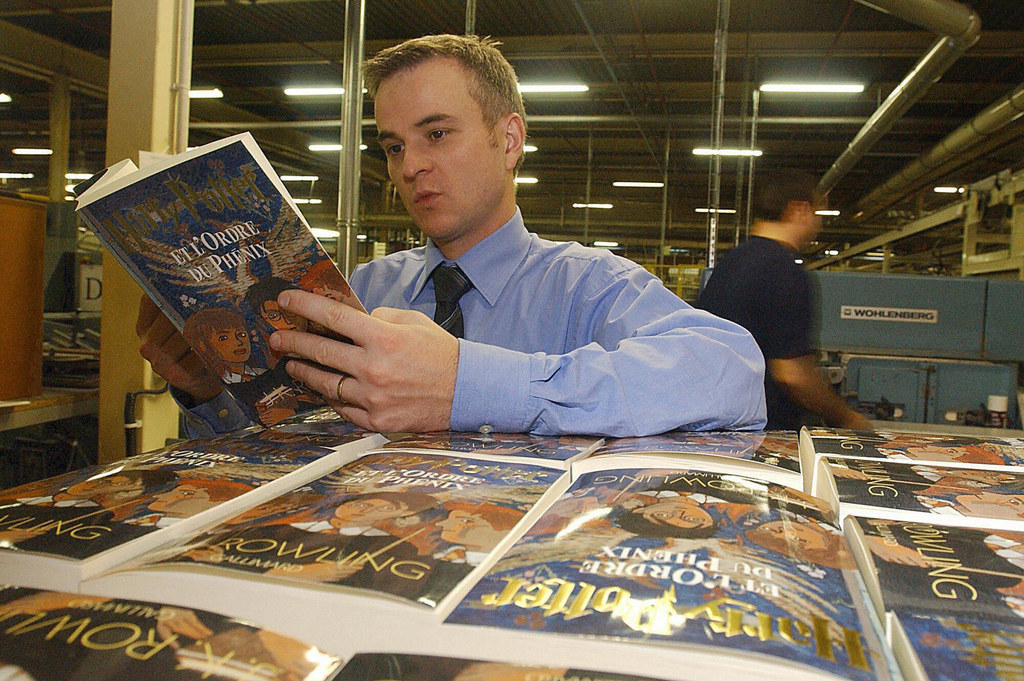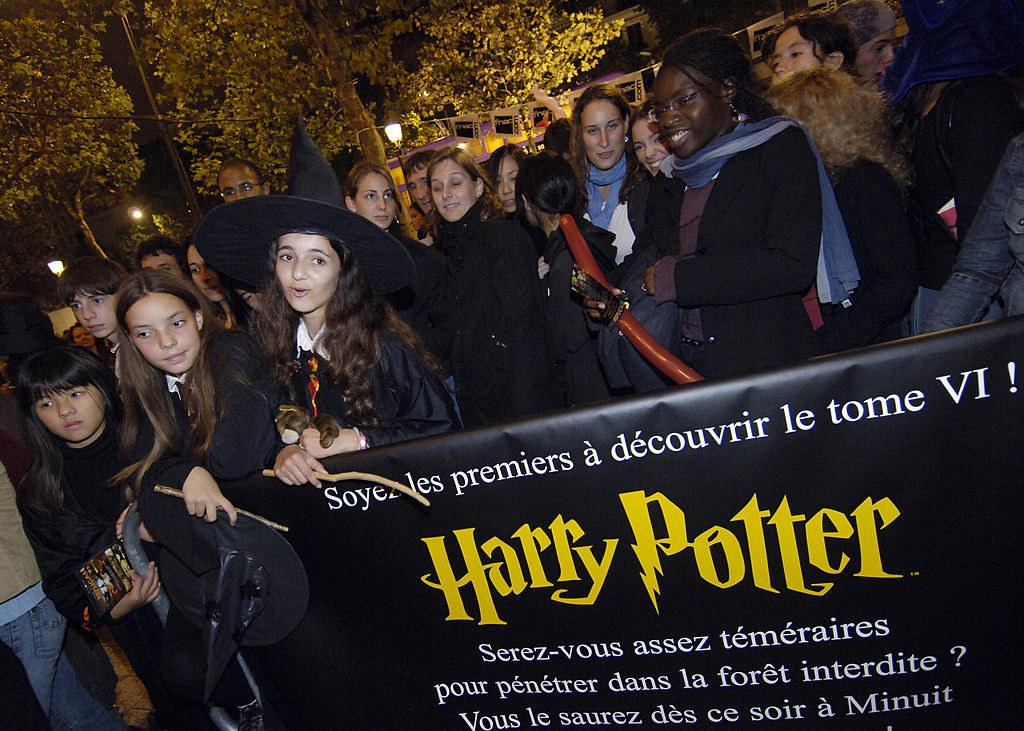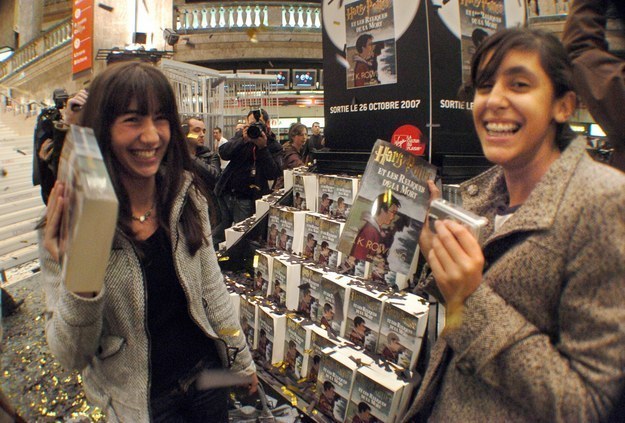
1. Hagrid doesn't have an accent in the French book or films.
In the original English-language books, Hagrid has a strong accent, but it disappears in the French translation. According to culture critic Isabelle Smadja, co-author of Harry Potter: Angel or Demon?, this choice may have been made to avoid offending people who may recognize their accent in a belittling context. The accent also disappears in the French dubbing of the films.
2. Harry Potter and The BFG have at least one thing in common...
The French writer who translated J.K. Rowling's beloved series is Jean-François Ménard, who was also Roald Dahl's favorite translator, as revealed in this interview with the French publishing house Gallimard (link in French). Ménard translated The BFG into French, where it's called The BGG or, "Le Bon Gros Géant," which means "The Good Fat Giant."
Apparently, Ménard's sense of humor, interest in magic, and an interest for the history of words and etymology made him the ideal choice for J.K. Rowling.
3. "Muggle" translated into "Moldu" for French readers.
To translate the word "Muggle," Ménard said in the publishing house interview that he invented the term "Moldu," as a reference to the French expression "mou du bulbe," (link in French) which means "soft in the head." He wanted to express the fact that Muggles were defined by the fact that they lacked something — i.e., magical abilities.

4. He even translated the unit of currency that Harry Potter's world uses.
To translate "sickle" to "mornille," Ménard found inspiration from the 19th century word mornifle, which meant "money."
5. And Ron Weasley's owl, Pigwidgeon, is renamed for a French mythical creature.
Ron's owl is named "Coquecigrue" in the French version of the books, which comes from the name of a mythical creature born from a rooster and a crane.
6. Dumbledore's name stays the same.
In English, "dumbledore" is a regional expression that means "bumblebee."
In French, "bumblebee is "bourdon," but Ménard didn't think "Professor Bourdon" had the same sense of gravity to it. As a result, he decided to keep the headmaster's name the way it was.
7. So does Hagrid's.
As J.K. Rowling explained in an interview in 1999, "Hagrid is also another Old English word, meaning — if you were hagrid — it's a dialect word, you'd had a bad night. Hagrid is a big drinker. He has a lot of bad nights." Ménard thus chose to keep the name, to preserve the etymology.

8. "Hufflepuff" translates, delightfully so, to "Poufsouffle."
In English, "Hufflepuff" refers to the expression "huff and puff," most notably used to describe the wolf blowing on the houses of the Three Little Pigs. For the French translation, Ménard wanted to keep the meaning by translating the House name to "Poufsouffle" to express the breathlessness and struggle that characterizes the students of that house.
9. And Snape is literally "Rogue."
To translate "Snape" (Old English meaning "reprimand" or "snub"), the translator chose "Rogue," a rare French word taken from the Old Norwegian "hrôkr" and meaning "arrogant" or "unpleasant." Still fitting, no?
10. J.K. Rowling's translator pulled 126-hour weeks to finish on time.
Ménard said that, thanks to the cramped deadlines, especially for the last books in the series, he would work every day of the week from 6 a.m. to midnight (link in French) to be able to finish the translations on time.
11. He also translated the chapters out of order.
In order to have a comprehensive understanding of the books, Ménard would translate each book starting with the first and the last chapters, (link in French) then the second and the penultimate chapters, and so on until he finished with the middle of the book.
12. Even as a translator, Ménard didn't get to find out about plot details in advance.
As a result, his biggest fear was that his translation of proper nouns would be contradicted later in the series. For example, if the name Tom Elvis Jedusor (Tom Marvolo Riddle) and the anagram "Je suis Voldemort" ("I am Lord Voldemort") had been revealed in separate books, the connection might not have worked out.
13. Ménard also found inspiration from typos.
He got the idea for the name "Ombrage" for "Umbridge" by seeing a typo (link in French) in a Newsweek article, where the name of the professor was misspelled as "Umbradge."

14. The Ravenclaw house is actually "Eagleclaw" in French.
English-language readers are sometimes disconcerted by the fact that, in the books, Ravenclaw mascot is an eagle. Ménard solved for this by translating the name of the house to "Serdaigle" (literally, "Eagleclaw") as opposed to "Serdecorbeau" ("Ravenclaw"), probably because it sounded better, too.
15. And "Hogwarts" becomes Poudlard, which means "bacon lice."
Ménard noted that many readers, at the beginning of the series, actually thought "Poudlard" was the original name of the school — which made him proud because he specifically wanted to find a name that kept the original meaning and "looked" like an English word.
16. In fact, Ménard tried to keep a lot of the character names as "English" sounding as possible.
For example, Mad-Eye Moody becomes Maugrey Fol Œil, a reference to the verb "maugréer" (which means to mumble). Borgin and Burkes becomes Barjow et Beurk (in reference to the French word "barjot" (which means "nutcase").
17. And even though a few puns got lost in translation, Ménard also invented a few of his own.
The French version loses a few of the jokes behind names like "Diagon Alley" and the "Knight Bus," but Ménard did invent words like "ratconfortant" to stand in for "rat tonic" or "Choixpeau" as the official name of the Sorting Hat.
18. And finally, the illustrated covers for the French Harry Potter books are way more introspective.

This post was translated from French.
